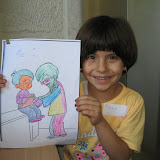

 Mohammed Hamdan died the other day, less than a week after returning to the Gaza strip to be near to his family as he went. The quickness in which his condition deteriorated once at home was much more rapid than we expected. It took several weeks to prepare to take him home. The 28 medications he was on needed to be changed to those available in the Gaza Strip, and he was taken off of the ones with a narcotic effect, and arrangements for direct ambulance transport needed to be arranged. His last day at the hospital was spend making sure all of his meds were in order, saying goodbye to everyone in the hospital, and the most surprising thing: making him human.
Mohammed Hamdan died the other day, less than a week after returning to the Gaza strip to be near to his family as he went. The quickness in which his condition deteriorated once at home was much more rapid than we expected. It took several weeks to prepare to take him home. The 28 medications he was on needed to be changed to those available in the Gaza Strip, and he was taken off of the ones with a narcotic effect, and arrangements for direct ambulance transport needed to be arranged. His last day at the hospital was spend making sure all of his meds were in order, saying goodbye to everyone in the hospital, and the most surprising thing: making him human. 


The appearance of Mohammed in the ICU has been that of a corpse, blue and nearly bloated beyond recognition. The ICU patients lay there nearly naked like cadavers, with various parts missing and instruments plugged into them; a cable from the skull, amputations and black extremities, IV holes and chest wounds which do not heal. So gruesome that when they look up at you or cry for their mother you are startled that what is before you really is alive, it’s not some sick plastic doll or horror movie prop.
But, because he was not on certain drugs the day he left, he looked like a little boy. His mother bought him a new set of clothes for the journey back home. It was not until after I had dressed him that I realized that in the 5 months he has been here I had not once seen him wearing clothes. There, seated before me, was a human being. It was surprising to me how much a little normalcy and dignity go in making the weak and helpless endlessly more human.

I have often felt guilty for giving up hope on Mohammed Hamdan, so much effort is put into sustaining him and there was so little chance that he would survive, and I found myself put to shame by most of the doctors who faithfully assessed him every day and treated him like any other patient. I would always pray for him, for his mother, and the situation surrounding them but I always struggled to get specific. I still do not know if it is right to pray that a child might die in this circumstance, that their suffering would end, that it would just be finished. To think of him as the moving cadaver in the ICU or the little boy dressed his finest to go home adds much to the question.


